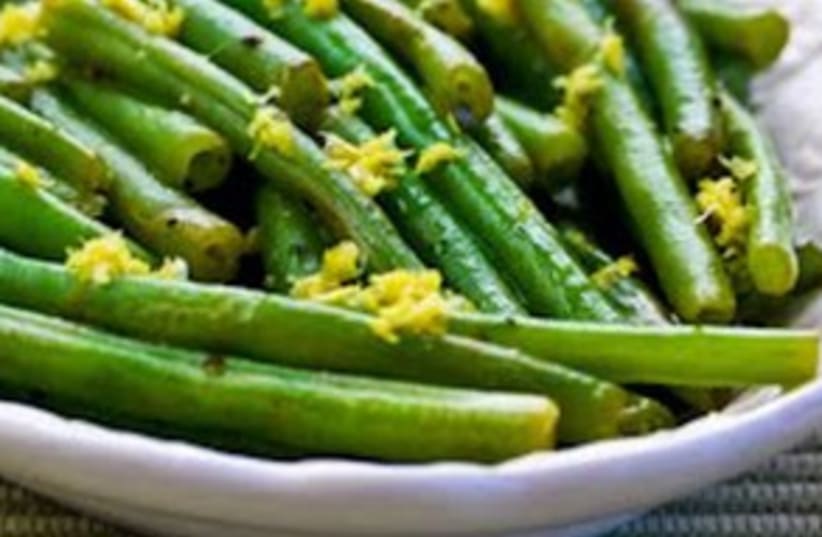Serves 6The Sephardi take on gefilte fish.This version comes from Leah Gueta who, together with two of her many sons, is the owner and proprietor of Gueta in Jaffa.6 pieces firm white fish, cut into chunks (about 1 kilo)1 head garlic, cloves peeled and crushed1 tsp. salt1 to 2 Tbsp. hot paprika1 Tbsp. sweet paprika2 heaping Tbsp. tomato paste11⁄4 cups water3 to 5 Tbsp. freshly squeezed lemon juice1⁄4 tsp. sugar1 level tsp. ground cumin1 level tsp. ground carawayWash the fish and season with a little salt. (If using frozen fish, sprinkle with a little lemon juice as well.) Let stand 5 minutes. Pat dry and place on a plate. Using a mortar and pestle, pound together crushed garlic and salt.Add the hot and sweet paprika and mix well.Heat 1⁄4 cup oil in a large skillet and cook the garlic-hot pepper mixture over low heat. Lightly sauté for two or three minutes, stirring constantly to prevent burning, till it turns a burgundy color.Stir in a quarter cup water and the tomato paste (The “secret,” according to Gueta, is to add the same amount of tomato paste as the garlic-hot pepper-water mixture).Cook 5 minutes over high heat, stirring constantly, until the sauce is fragrant and bubbly.Add the remaining 1 cup water and the sugar. Lower heat and cover, scraping the bottom of the pan occasionally (the paprika has a tendency to stick to the bottom), for 10 minutes. The oil will separate from the paprika.The consistency of the sauce should be “thinner than ketchup,” Gueta adds.Place the fish in the pan in one layer and add warm water to almost cover. Sprinkle over the cumin and caraway and a little more salt if necessary. Bring to a boil, cover and cook on high heat for 5 minutes. Lower heat and squeeze the lemon juice to taste on top. Cover and simmer 7-10 minutes till done.
Our mistress of the spices
An upcoming festival in memory of the amazing Dona Gracia is reason enough to try a couple of Sephardi recipes.

Serves 6The Sephardi take on gefilte fish.This version comes from Leah Gueta who, together with two of her many sons, is the owner and proprietor of Gueta in Jaffa.6 pieces firm white fish, cut into chunks (about 1 kilo)1 head garlic, cloves peeled and crushed1 tsp. salt1 to 2 Tbsp. hot paprika1 Tbsp. sweet paprika2 heaping Tbsp. tomato paste11⁄4 cups water3 to 5 Tbsp. freshly squeezed lemon juice1⁄4 tsp. sugar1 level tsp. ground cumin1 level tsp. ground carawayWash the fish and season with a little salt. (If using frozen fish, sprinkle with a little lemon juice as well.) Let stand 5 minutes. Pat dry and place on a plate. Using a mortar and pestle, pound together crushed garlic and salt.Add the hot and sweet paprika and mix well.Heat 1⁄4 cup oil in a large skillet and cook the garlic-hot pepper mixture over low heat. Lightly sauté for two or three minutes, stirring constantly to prevent burning, till it turns a burgundy color.Stir in a quarter cup water and the tomato paste (The “secret,” according to Gueta, is to add the same amount of tomato paste as the garlic-hot pepper-water mixture).Cook 5 minutes over high heat, stirring constantly, until the sauce is fragrant and bubbly.Add the remaining 1 cup water and the sugar. Lower heat and cover, scraping the bottom of the pan occasionally (the paprika has a tendency to stick to the bottom), for 10 minutes. The oil will separate from the paprika.The consistency of the sauce should be “thinner than ketchup,” Gueta adds.Place the fish in the pan in one layer and add warm water to almost cover. Sprinkle over the cumin and caraway and a little more salt if necessary. Bring to a boil, cover and cook on high heat for 5 minutes. Lower heat and squeeze the lemon juice to taste on top. Cover and simmer 7-10 minutes till done.